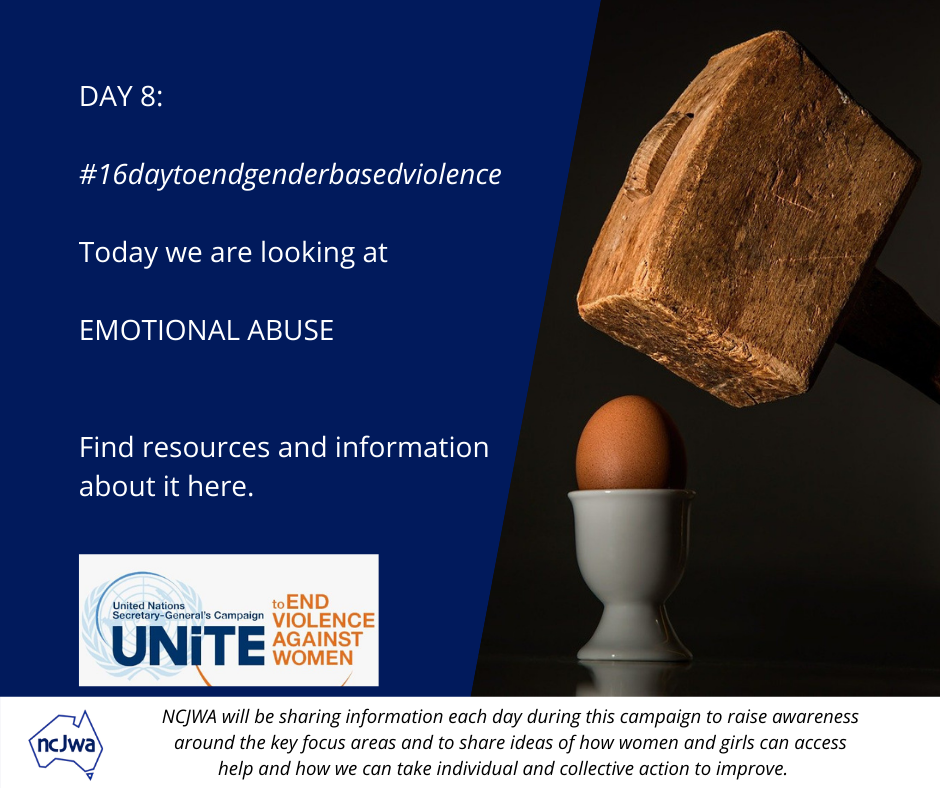EMOTIONAL / PSYCHOLOGICAL ABUSE
Emotional abuse is any nonphysical behaviour or attitude that controls, intimidates, subjugates, demeans, punishes or isolates another person by using degradation, humiliation or fear. It is an attack on the psychological welfare or mental health of the victim and has the power to alter their behaviours as well as create lasting scars on their self perception and their mental health.
Emotional abuse is about one person maintaining power or control over another person. It usually takes place between intimate partners, or comes from a parent to a child. It can also happen in situations such as schools or workplaces


%
Australian Women Suffer from Emotional Abuse in their Lifetime
%
Australian Men Suffer from Emotional Abuse in their Lifetime
Mental Health and Self Perception
Mental Health is such a fragile thing. It is made up of all the words we tell ourselves, and the voices of those closest to us shape the patterns of the words we say to ourselves.
Life coaches have this notion of a mirror. Each person you know, behaves in a particular manner and our brains believe this to be a mirror of what we deserve and who we are. The problem with this, is the more consistently we hear words that describe us, and see demonstrations of our worth – the more we believe them.
When this is done in a healthy relationship it can be wonderful. People learn to take certain risks, build confidence and the other peoples behaviour is used as feedback so we can see our impact on the world.
In an unhealthy relationship that feedback is one that has been significantly distorted. Our perception of ourselves becomes morphed and mangled into the small creature that the abuser wishes us to believe ourselves to be. And much like the elephant in the circus who has a chain around her ankle, but it is untethered – yet she still stands where she is because she does not know she has the power to walk away. So to does the victim of emotional abuse stay. For they do not percieve their own power.
If you are someone who is experiencing emotional abuse we hope that you reach out the resources listed below!
Actions That are Emotionally Abusive if Repeated
- – Verbal abuse: yelling at you, insulting you or swearing at you.
- – Rejection: Constantly rejecting your thoughts, ideas and opinions.
- – Gaslighting: making you doubt your own feelings and thoughts, and even your sanity, by manipulating the truth.
- – Belittling: calling you names or telling you that you’re stupid, publicly embarrassing you, blaming you for everything. Public humiliation is also a form of social abuse.
- – Causing fear: making you feel afraid, intimidated or threatened.
- – Isolation: limiting your freedom of movement, stopping you from contacting other people (such as friends or family).
- – Financial abuse: controlling or withholding your money, preventing you from working or studying, stealing from you. Financial abuse is another form of domestic violence.
- – Bullying and intimidation: purposely and repeatedly saying or doing things that are intended to hurt you.
Side effects of being Emotionally Abused
- – poor relationship satisfaction
- – symptoms of anxiety and depression
- – insomnia
- – low self-esteem
- – suicidal thoughts
- – increased physical health problems
- (such as migraine, indigestion, stomach ulcers, chronic pain and chronic disease)
No one behaves perfectly in their relationships all the time. However, when someone deliberately hurts you over and over again it becomes abusive.
Getting help and support for emotional / psychological abuse
For free and confidential help with legal help, advice, or urgent help with emotional / psychological abuse.
Crisis support
Lifeline – 13 11 14
Family violence, abuse and sexual assault counselling
- 1800RESPECT – 1800 737 732
Jewish Care NSW
https://www.jewishcare.org.au/page/services/individual-and-family-services/healthy-communities
Jewish Care VIC
https://jewishcare.com.au/domestic-violence/
Sources
https://www.1800respect.org.au/violence-and-abuse/psychological-abuse
https://www.australiacounselling.com.au/emotional-abuse-what-is-it/
https://www.abs.gov.au/ausstats/abs@.nsf/Lookup/4102.0main+features602014
https://www.healthdirect.gov.au/emotional-abuse
https://au.reachout.com/articles/what-is-emotional-abuse
